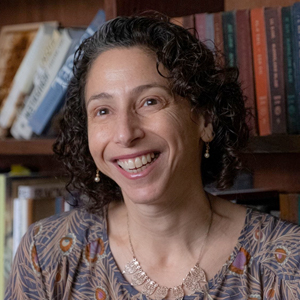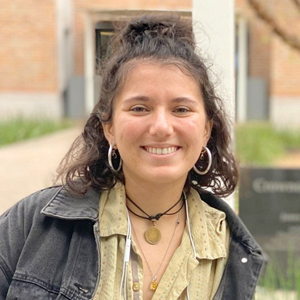“College professors tend not to allow you to include a Wikipedia article as a citation in a paper you write. So what are you doing encouraging your students to go to Wikipedia?” Houston Matters host Craig Cohen asked Dr. Melissa Weininger in a radio interview last week.

“Well, I’m not encouraging them to go to Wikipedia but to write well-sourced, well researched Wikipedia entries,” Dr. Weininger clarified. “We all know that people do use Wikipedia. Even if you’re not allowed to use it for your college course, we certainly look to Wikipedia when we need a little bit of information about something. And so it’s really important that the information that’s on Wikipedia is reliable.”
Dr. Weininger began teaching a Wikipedia writing assignment in her course, Sex and Gender in Modern Jewish Culture, at Rice University last fall. Through it, students discussed issues of inequity in Wikipedia’s content and the importance of access to accurate, verifiable information.
“I think we’ve all learned in the last years about how important it is for everybody, but students in particular, to be able to differentiate between reliable and unreliable information on the internet,” Dr. Weininger continued. “So one of the things the students learned in doing the project is—it was a way of reverse engineering that process. They learned how Wikipedia entries are built and therefore what their strengths and weaknesses can be.”
The lack of equal representation of biographies of women on Wikipedia “was one of the reasons for starting this project.” Dr. Weininger was interested in exploring writing as activism with students.
“Part of that is to teach the students that their words and their actions have power, that the information that is available to us on the internet can also be a source of power. If there’s less information available to us about women, we learn that women aren’t as valuable in our culture and we simply don’t have access to their stories. So the assignments for the class were all structured around this idea of not just improving our access to information about women on Wikipedia, but thinking about how what we do in the classroom, what we learn in the classroom, and how our own writing can really be of benefit to the public sphere in general.”

Dr. Weininger was joined by one of her former students who had completed the assignment, Sarah Silberman, who drastically improved Jewish social historian Paula Hyman’s biography (see the Dashboard’s Authorship Highlighting tool in action here!).
“At Rice I’m a double history and French major,” Sarah shared. “So in other Jewish history classes I actually read a good number of Paula Hyman articles and I read excerpts from books she had written. I really wanted to write about her because looking at her Wikipedia article, it just looked so sad and sparse in comparison to all the amazing things she’s done in her life and I wanted people to know that.”
“There’s a potential downside to crowdsourcing on Wikipedia,” the interviewer suggested, “where someone like you, Sarah, will write this extensive article, have well-cited sources, and then somebody else will come along and decide to change it without any particular citation. Did you track your article to see if others were coming along and making tweaks to it?”
“I have actually gone back a few times to make sure everything with Paula’s article is tip-top shape and so far no one has changed anything,” Sarah responded. “But even so, it tends to be that people on Wikipedia change things for the better. If my language was too subjective, citing too much of an opinion rather than a fact, then it would be changing something like that.”
“When my students published their entries, I immediately started circulating them to other people,” said Dr. Weininger. “And to be honest, other academics were really excited about it and excited to see that my students had really improved the quality of entries about these women who were extremely important.”
“Wikipedia itself might not be a reliable source as a place to look for all of your information,” she noted. “But it does actually have pretty stringent citation standards. So one of the things students also learn from this is the way to fact-check Wikipedia is by going back to the original sources because they’re all cited at the end of the article.”
”A lot of my students have grown up with Wikipedia and Googling things, but haven’t thought very much about where that information comes from. And when you yourself write an entry, all of a sudden all of that is open to you. And you have a much clearer understanding of how these things are put together, maybe who’s putting these things together, what’s involved in it, what the potential pitfalls are, and also the potential advantages.”
“Most projects in a classroom-setting are done in the classroom,” the interviewer noted. “This is one that is sort of public record. Did you have any qualms about doing a project that is so out there?”
“Well no,” Dr. Weininger answered, “and that’s mostly a testament to how great Rice students are and the students in this class were. I actually wasn’t worried about that at all. And there are also advantages that come with that risk—the public nature of this project. And that is that students get to see their work published. One of the great things to see was the day that the articles were due and they had to post them online. … They were all saying, ‘I wrote this and it’s on the internet!’ That’s a really exciting thing, and hopefully it gets them excited about doing it more now that they have the skills and the ability to do it. So there’s some risk involved, but a lot of reward. And I knew they were up to it and they really did such a fantastic job.”
“I actually really did enjoy doing this project,” Sarah added. “I would love to continue doing this as a side hobby or something. … I think this should be more prominent in college classes and in university classes. I think that, like Dr. Weininger was saying, not only was it satisfying from a student perspective to see that my work was published and that it was doing a public good, but also it’s just a way for our work to have greater impact. Because a lot of times I write papers, they’ll go to my professor, my professor will read them, and then that’s the end of it. It doesn’t really go anywhere beyond that. So having a project that actually has some impact on the world is really important. And I think academia should take advantage of more opportunities like that.”
To incorporate a Wikipedia writing assignment into an upcoming course, visit teach.wikiedu.org for access to free resources and assignment templates.
To read more about Dr. Weininger’s class, check out this blog post.
To listen to the original interview (which begins at minute 11:10), visit Houston Matters.
